Hong Kong News

Hong Kong wraps up first ‘patriots-only’ polls, with minor hiccup on count
Hong Kong wrapped up its first critical election under the Beijing-decreed electoral overhaul on Sunday largely without incident and a voter turnout of 90 per cent in a race designed to ensure only “patriots” have a say in governing the city.
Compared with 2016, the last time an Election Committee poll was held, individual votes had been slashed drastically and instead corporate votes – those representing organisations and companies – held sway and, with that, the pan-democrats’ long-established presence was all but formally obliterated.
Hong Kong’s senior officials and prominent business and community leaders who showed up at the five polling stations across the city lauded the elections as an important milestone for the city to start over and reform governance after the protests of 2019. But some residents complained they felt disenfranchised and called on the government to expand the electorate in future.
Only two candidates friendly to the opposition camp, Tik Chi-yuen, 63, and Francis Chau Yin-ming, 60, were vying to win seats in the 1,500-member committee with its newly enhanced powers not just to elect the city’s next chief executive but also nominate lawmakers and field up to 40 of its members for the Legislative Council. They were the only two such candidates who were approved by prior vetting.
Under the central government’s radical revamp to ensure only “patriots” govern Hong Kong, the original 1,200-strong Election Committee was expanded by 300 seats, making up the new fifth sector of ultra loyalists hailing from mostly pro-Beijing organisations.
Sunday’s polls were “laying the foundation for future elections”, Chief Executive Carrie Lam Cheng Yuet-ngor said after visiting the Convention and Exhibition Centre polling station before voting began at 9am. The city will hold elections for the 90-member Legislative Council
in December, and for the chief executive race in March.
After voting ended at 6pm, Electoral Affairs Commission chairman Barnabas Fung Wah said 4,380 people cast their ballots, or about 90 per cent of those eligible. Three subsectors in the legal, technology and innovation, and architectural, surveying, planning and landscape arenas, which have 30, 54 and 55 voters respectively, achieved a 100 per cent turnout.
Vote counting faced a hiccup. Due to begin at 8pm, counting was delayed by over an hour after “some documents” were left behind in the polling station in the Convention and Exhibition Centre when ballot boxes were being delivered to the central counting station in the same building. Extra time was spent on ferrying the forgotten documents and cross-checking, Fung said, attributing the latter to the first-time use of an electronic voter register.
Fung declined to reveal the nature of the documents, beyond stressing they were not ballot papers and vowing a full report and analysis on the delay.
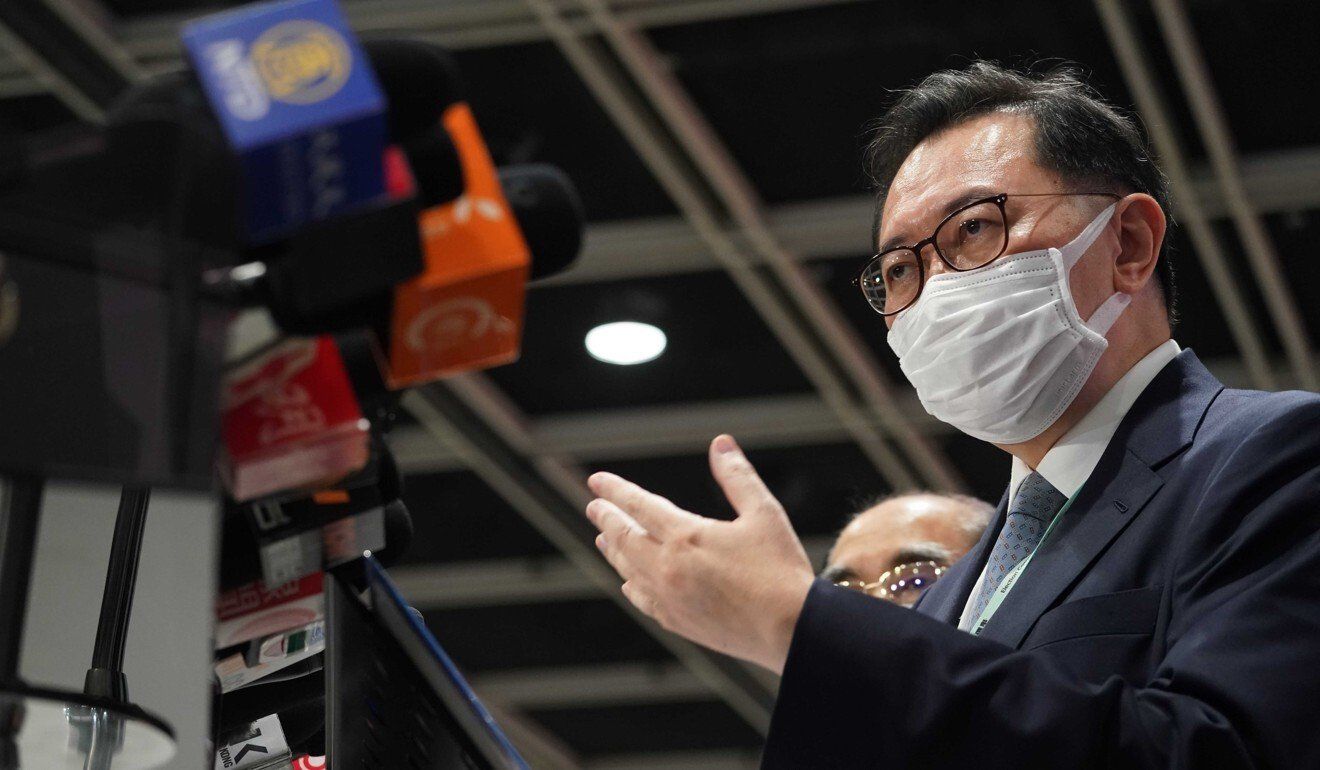 Electoral Affairs Committee chairman Barnabas Fung.
Electoral Affairs Committee chairman Barnabas Fung.
He also revealed accounting statistics recorded digitally in certain polling stations did not match handwritten data. Station staff, hence, had to cross-check statistics manually.
“In the past they only had to record by means of the handwritten statistics, this time we have used the computer to issue ballot papers, so there is one more step,” he said.
“We will look into the process to see if it can be streamlined.”
Complaints also emerged about a long queue at Kowloon Park polling station because of the new electronic register that Fung admitted took officers and voters some getting used to.
“The operation of the electronic system was smooth and satisfactory, but staff members were not too familiar with it at first,” he said.
There was also the issue of unregistered voters joining queues, believing they could vote.
“I was also told that there were many unregistered voters who queued up. Some thought they could cast a ballot even though we had widely publicised [about the elections],” he said. “In future, we will see if there are ways to let the public better understand that only registered voters could enter the stations.”
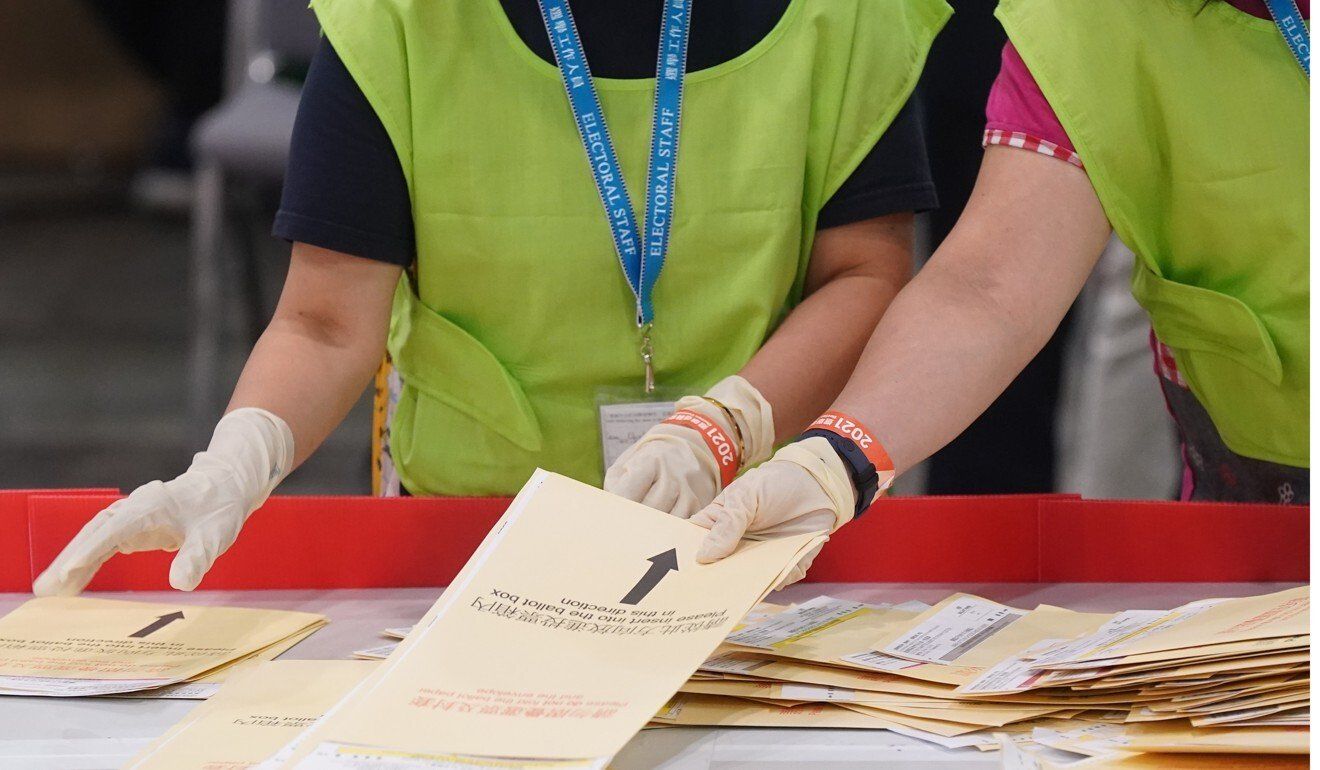 The count was meant to start at around 8pm but was held up.
The count was meant to start at around 8pm but was held up.
As of 3am on Monday, counting was still under way with results yet to be announced.
Earlier, acknowledging the much smaller voter base for Sunday’s polls, Lam maintained that the voters were, however, now more representative.
Only 8,000 people were eligible to vote, a dramatic reduction of about 97 per cent from 246,440 voters in 2016. Beijing officials and Hong Kong ministers on Sunday repeatedly sought to explain that, where individual voters accounted for the bulk of the base in the past, a change in favour of corporate voters
representing their organisations or sectors, made the committee more reflective of wider society.
But all of the pan-democrats or opposition faces in the previous Election Committee were conspicuously absent, partly because most were either in prison for various charges including on national security or had fled the city amid a crackdown after the imposition of the security legislation. Nearly all would have failed to qualify under the new criteria of “patriots ruling Hong Kong” given the charges they faced.
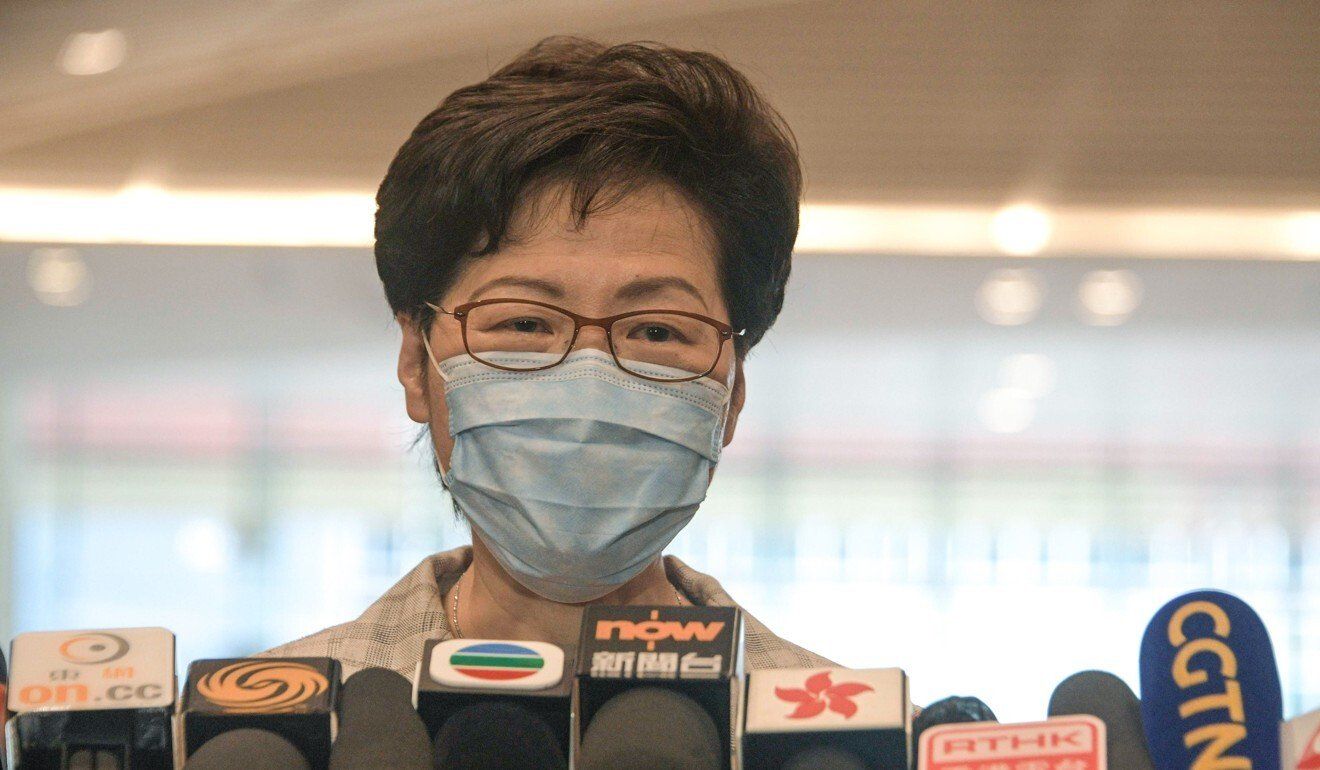 Hong Kong leader Carrie Lam.
Hong Kong leader Carrie Lam.
Asked by local media if the electoral reforms were meant to shut out all opposition voices, Lam defended the overhaul as a “very legitimate objective” to improve the system to bring “patriots” into government.
“I doubt very much that another government or another country will allow the public elections to their local legislature to consist of people whose mission is to undermine the national interest or national security,” Lam said.
“We still welcome people from all walks of life and people who have different opinions about government policies to go into the political system as long as we all share the common objective that we will continue to succeed under ‘one country, two systems’ and we will not do anything to undermine national security.”
She noted that the committee now had a more “balanced participation”, and included groups previously underrepresented but she did not cite specific examples.
The election had seen the emergence of grass-roots groups previously not included in the committee, such as the Hong Kong Island Federation, more than 20 associations of Chinese fellow townsmen, including the Federation of Hong Kong Guangdong Community Organisations, and associations of Hong Kong residents on the mainland, such as the Hong Kong Chamber of Commerce in China.
Ahead of Sunday’s poll, most of the 1,500 seats had already been allocated to ex officio members or were won uncontested. Only 412 candidates competed for 364 seats in 13 of the 40 subsectors, meaning some 4,889 voters were eligible to vote at five polling stations in Wan Chai, Tsim Sha Tsui, Sha Tin, Tsuen Wan and Tuen Mun.
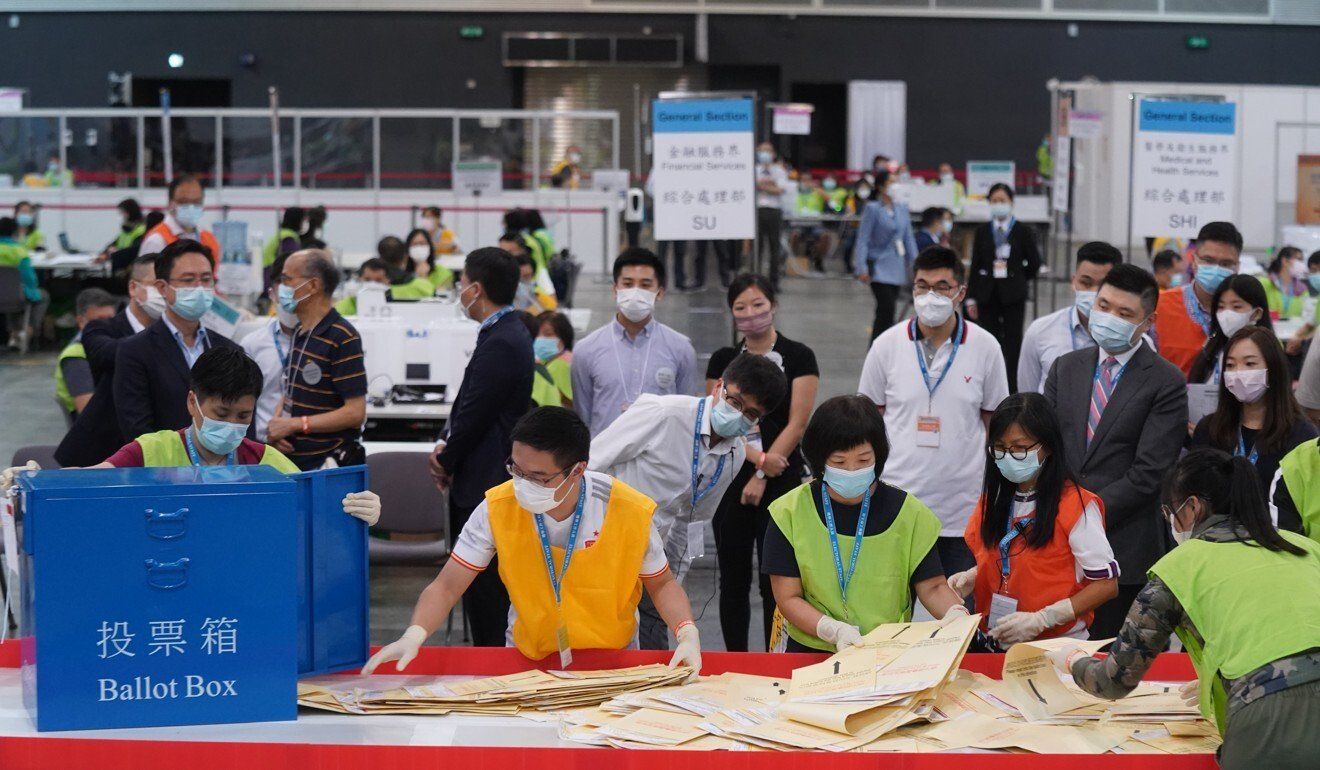 The vote counting was going on well after midnight.
The vote counting was going on well after midnight.
Among the 4,889 voters, there are 1,940 individual voters in the area and district committees subsectors, the remaining 2,949 are corporate voters, representing various bodies and companies.
Opposition-friendly candidate Tik, founder of the centrist Third Side party, said there was still room for opposition candidates in the coming Legco elections if they were proactive in seizing opportunities.
“I know some pro-democracy parties have pretty much given up on these elections, but it doesn’t have to be like that. Opposition voices are still important in Hong Kong,” he said after casting his vote at Kowloon Park.
Polling was held amid tight security with 6,000 police officers deployed to maintain order. Voting began at a very brisk pace at 9am, as voters from the four sectors of business, professional, and social and district bodies showed up at their respective centres to cast their ballots, along with scores of unregistered voters who were later turned away.
By afternoon, three of the five stations barely had anyone turning up, as voter turnout clocked record high figures for the different sectors.
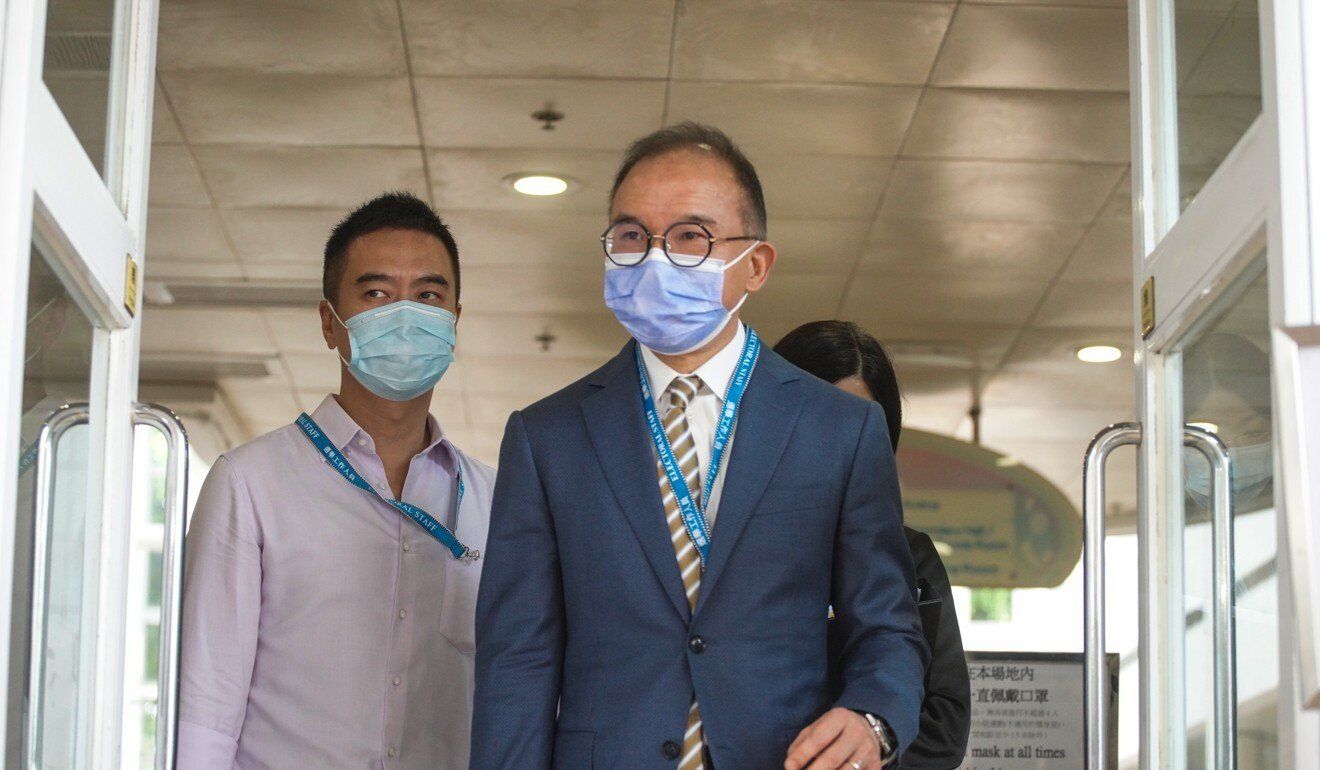 Constitutional affairs chief Erick Tsang.
Constitutional affairs chief Erick Tsang.
Among the voters was Chua Hoi-wai, chief executive of the Hong Kong Council of Social Service. He said given the electoral changes, he could only soldier on within the new framework but treasured his chance to vote all the same.
“It’s rare to get a vote these days, so it’s all the more important to vote for someone I support,” he said after voting at the Wan Chai polling station set up in the Convention and Exhibition Centre.
Executive Council convenor Bernard Chan also defended the decision to slash the number of people eligible to do so.
“I don’t think the reduction is important. What’s important is whether we choose the right people for Hong Kong,” he said after casting his ballot for the insurance sector.
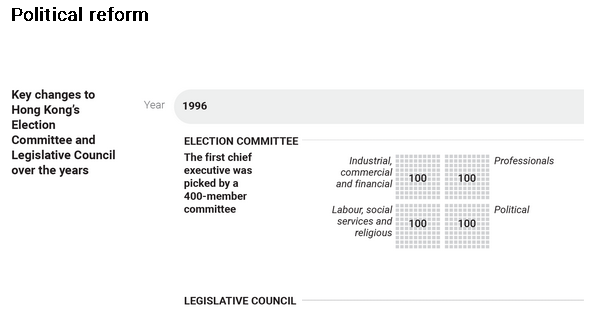
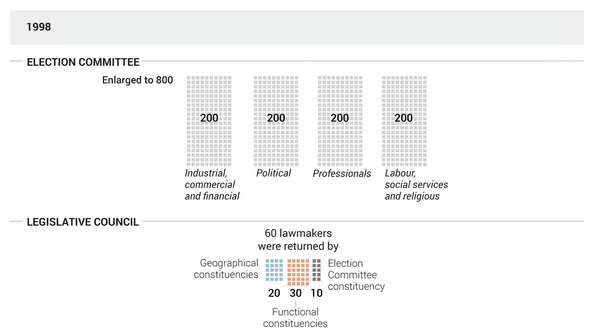
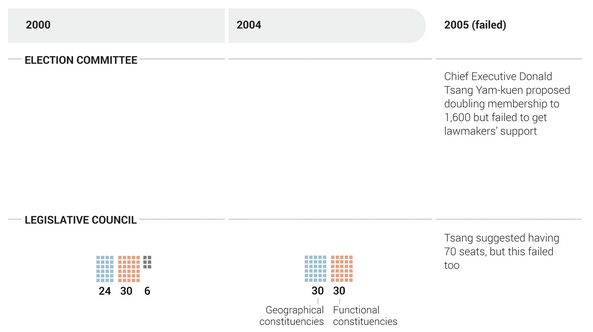
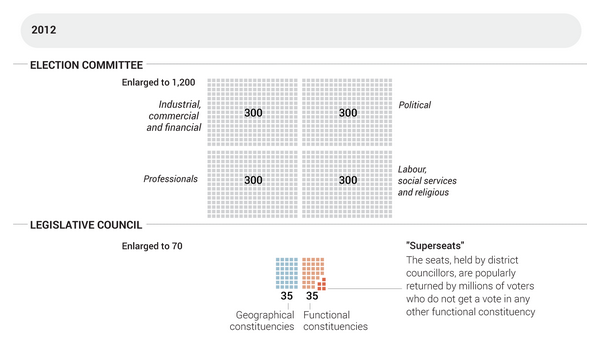
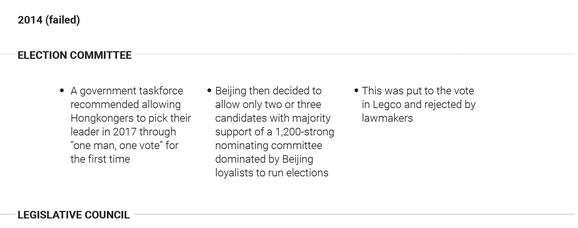
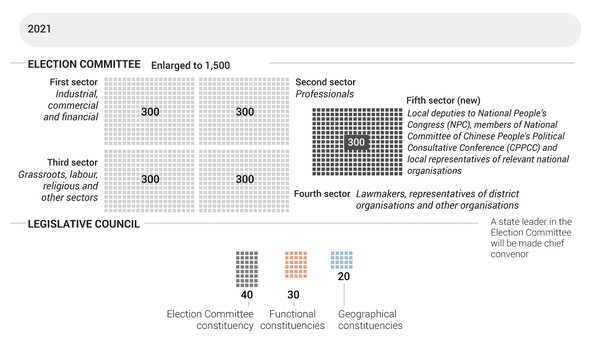
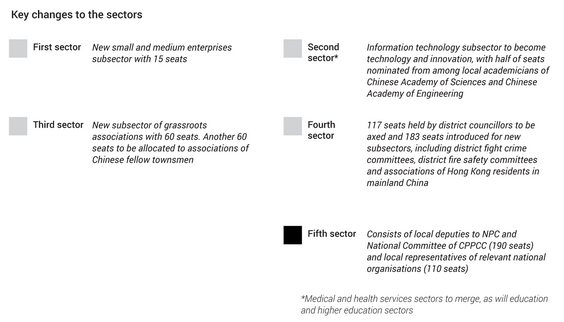
With Chinese Vice-Premier Han Zheng telling Lam on Saturday that the Election Committee elections and other polls must be executed smoothly, police commissioner Raymond Siu Chak-yee, Secretary for Security Chris Tang Ping-keung and Secretary for Constitutional and Mainland Affairs Erick Tsang Kwok-wai were spotted inspecting various polling stations throughout the day.
After visiting the one in Sha Tin, Tsang dismissed claims the polls were a small-circle election, insisting the fewer than 5,000 electors were a “microcosm of society” and represented balanced participation by the city’s 7.5 million residents.
“We have always talked about a democratic system that fits the circumstances of Hong Kong instead of one which only pursues high turnout or fierce competition,” Tsang told reporters.
Earlier in the day, Fung, the Electoral Affairs Committee chief, praised the incident-free operation, while declining to compare the polls with previous ones he had also overseen.
“I went to the polling station this morning and the operation went smoothly,” he said, adding that three complaints had been received: two about the conduct of polling staff and one challenging the eligibility of a voter.
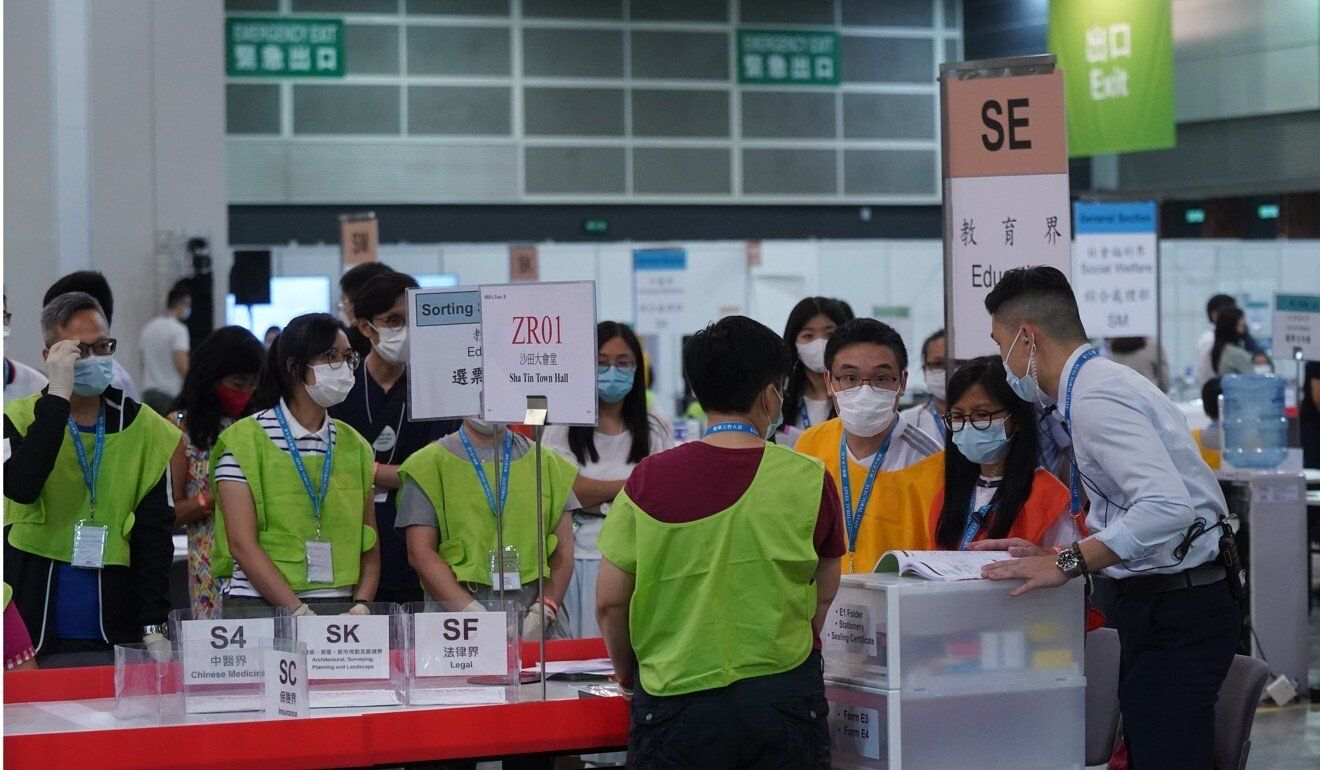 Ballots were to be tallied at a central counting station.
Ballots were to be tallied at a central counting station.
Several other better-known figures casting their votes also offered optimistic takes on the new system. Among them was Reverend Peter Koon Ho-ming.
Koon, there to vote in the social welfare subsector, noted the calm nature of the polls, which were taking place amid a near total absence of an opposition he blamed for “past quarrels and disputes”.
“If it can be shown that Hong Kong can carry out the ‘one country, two systems’ principle and develop closer ties with mainland China, the voter base may be [expanded] a little in the future,” he said.
Casting his vote for the legal sector was Anthony Neoh, who showed up in a cap with a logo marking the 100th anniversary of the Communist Party.
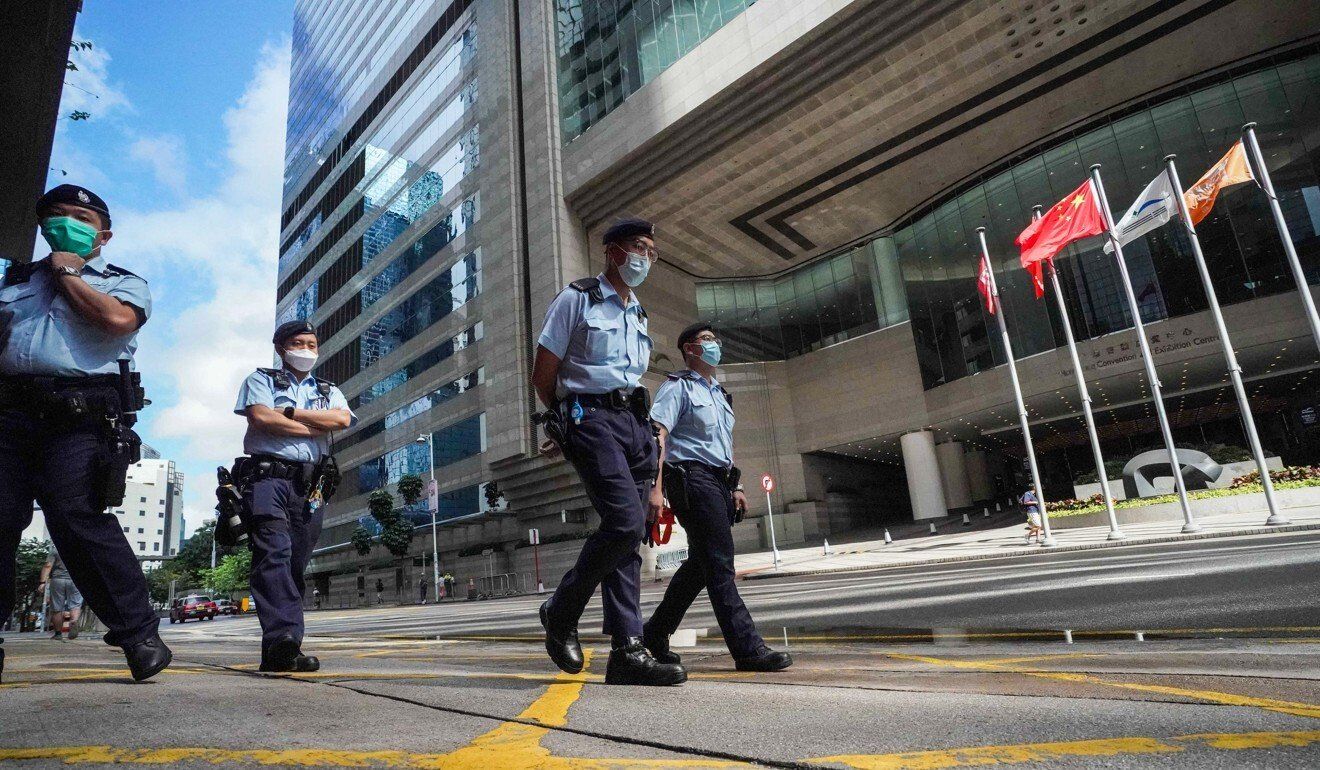 Police officers on patrol outside the convention centre.
Police officers on patrol outside the convention centre.
But not everyone was happy. A 19-year-old who asked to be identified only as Maximillian, briefly stopped outside Kowloon Park Sports Centre to stage a protest, holding a sign that read: “Improve the electoral system? It’s all a big joke”.
“This is not an election. They are just trying to wipe out anyone with a different opinion,” he told a group of reporters before leaving soon after.
Also outside the building, a 24-year-old accountant named Ryan told the Post he was largely unaware of the elections taking place inside.
“I vaguely heard it was happening, but it’s just a small group of people taking part,” he said.
A retired Hongkonger who identified himself as Mr Cheung, 63, spoke to the Post after stopping to observe the scene in Wan Chai.
“There are so many people walking past this spot,” he said of the Convention and Exhibition Centre, where a jewellery fair was also taking place. “But only a few can go in and vote.”
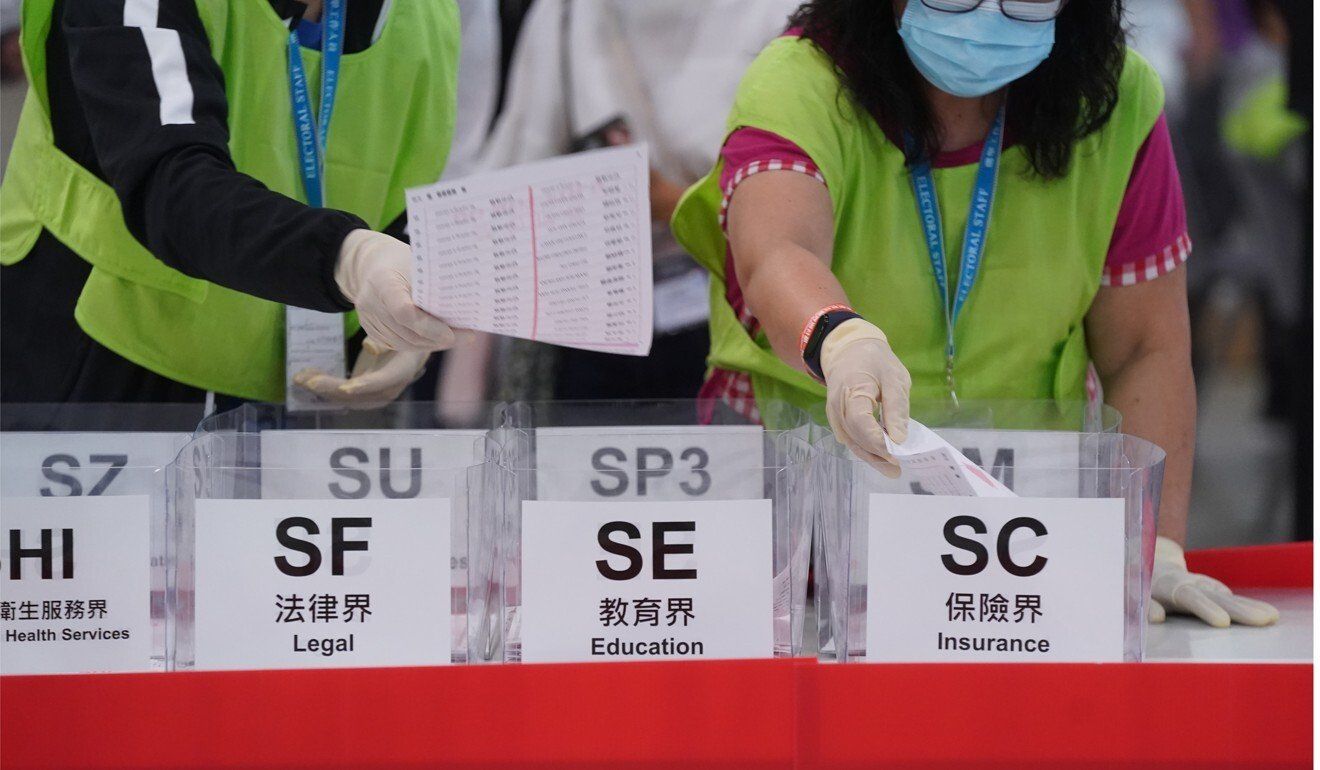 Only 412 candidates competed for 364 seats in 13 subsectors.
Only 412 candidates competed for 364 seats in 13 subsectors.
Sha Tin resident Mr Wong said he too was unaware of the polls taking place just yards from a playground where his children were taking pictures with Snoopy characters.
“I do not know what’s happening, and I am not interested in knowing,” the 49-year-old said.
Baptist University political science professor Kenneth Chan Ka-lok, a former opposition lawmaker, and some students undertaking a project to observe the elections had their identification checked outside Kowloon Park Sports Centre at about 3.30pm. Chan said officers had demanded to know what they were doing and took photos of them.
“I just told them what we’re doing. There always used to be people observing elections in the past, but not any more,” Chan said.
He said his team had spotted alleged irregularities, with candidates welcoming, thanking and having photos taken with voters in areas where soliciting of ballots was not allowed. He said he would publish a full report in due course.











